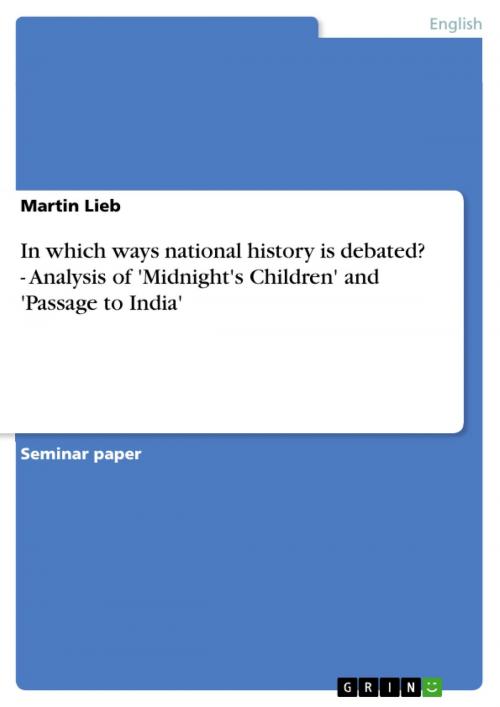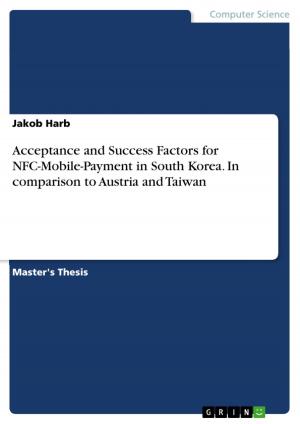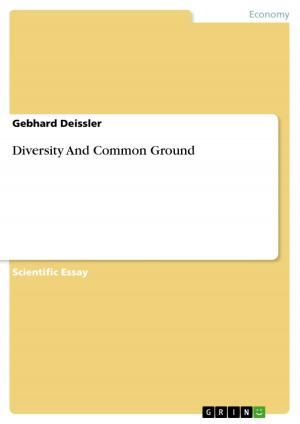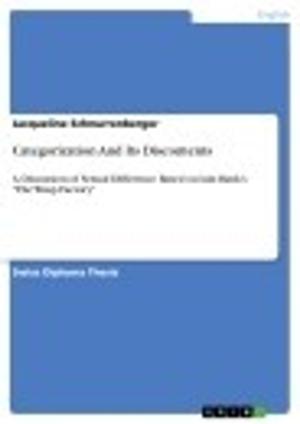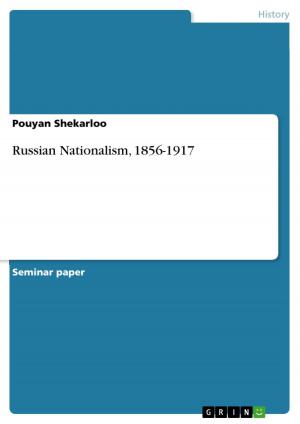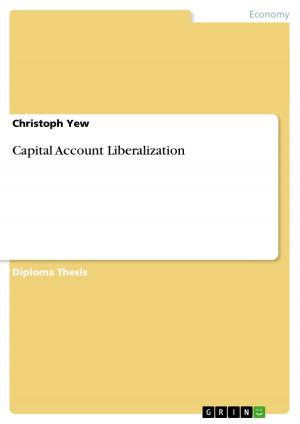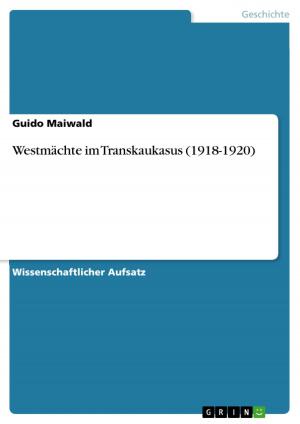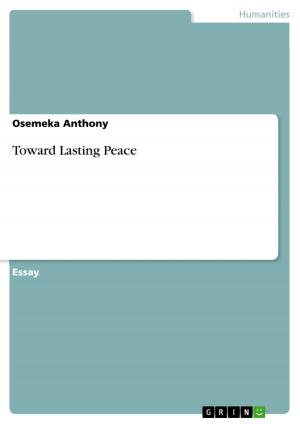In which ways national history is debated? - Analysis of 'Midnight's Children' and 'Passage to India'
Analysis of 'Midnight's Children' and 'Passage to India'
Fiction & Literature, Literary Theory & Criticism, British| Author: | Martin Lieb | ISBN: | 9783638050432 |
| Publisher: | GRIN Publishing | Publication: | May 20, 2008 |
| Imprint: | GRIN Publishing | Language: | English |
| Author: | Martin Lieb |
| ISBN: | 9783638050432 |
| Publisher: | GRIN Publishing |
| Publication: | May 20, 2008 |
| Imprint: | GRIN Publishing |
| Language: | English |
Seminar paper from the year 2003 in the subject English Language and Literature Studies - Literature, grade: 64 % , University of Sussex (University of Sussex - Humanities), course: Postcolonial Perspectives, 3 entries in the bibliography, language: English, abstract: In my essay, I will talk about Midnight's Children (1995,ed.) by Salman Rushdie and E.M. Forster's A Passage to India (1989,ed.). I may not always be totally directed towards the essay question but make a general comparison of the two novels as well. I will discuss the way in which India is presented in both texts and talk about national identity. In modern literature, often the private is political and the political is private. In reality it's not. Cultures and societies function totally different from individuals. But both Forster and Rushdie use their characters as metaphors for their countries and cultures. A novel lives from its characters and allows deep insights in their minds, foremost its hero's and its narrator's. Saleem is the main character of Midnight's Children and tells his lifestory to Padma, in A Passage to India there is an omniscent narrator who comments a few times on his own account. Rushdie's Saleem is modern India and the relationships between Forster's characters symbolize the cultural conflict of the Empire and its colony. Saleem's family history and genealogy is the Indian history, with its complex mixture of British imperialism and traditional Indian culture. East vs. West, and Rushdie admits the British a prominent role in modern India. Even though they were usurpators the Indians seem to have taken over parts of British culture and try to make their way into modernity, which is a Western, occidental, project. The linkage between history and fiction, Saleem and India, is obvious. Rushdie tries to tell the story of his country and he is probably aiming at a Western audience. The autobiographic impulses in his works are very important, and Saleem's life and family tree has obvious similiarities to Rushdie's. He makes excessive use of his creative freedom, and it is never clear where reality ends and fiction begins. He certainly wants to express with it the irrationality of Indian culture, its faible for myths and magic, surrealism. The novels were written and take place in totally different times: Midnight's Children is postcolonial, A Passage to India takes place at the height of the British Empire, where its downfall is already visible, though. The novel has a definitely tragic, pessimistic and melancholic undertone, as many novels written at the turn of the century or after World War One, at the prime of novelwriting culture. The bourgeoise world, the creator of the genre, was falling apart; the mood at the end of the 19th century and inbetween the two world wars was definitely apocalyptic. Forster makes many references to the reality of the Indian and British relationship and the history of this colony, but his characters are not elevated to the representation of a whole nation as Saleem is.
Seminar paper from the year 2003 in the subject English Language and Literature Studies - Literature, grade: 64 % , University of Sussex (University of Sussex - Humanities), course: Postcolonial Perspectives, 3 entries in the bibliography, language: English, abstract: In my essay, I will talk about Midnight's Children (1995,ed.) by Salman Rushdie and E.M. Forster's A Passage to India (1989,ed.). I may not always be totally directed towards the essay question but make a general comparison of the two novels as well. I will discuss the way in which India is presented in both texts and talk about national identity. In modern literature, often the private is political and the political is private. In reality it's not. Cultures and societies function totally different from individuals. But both Forster and Rushdie use their characters as metaphors for their countries and cultures. A novel lives from its characters and allows deep insights in their minds, foremost its hero's and its narrator's. Saleem is the main character of Midnight's Children and tells his lifestory to Padma, in A Passage to India there is an omniscent narrator who comments a few times on his own account. Rushdie's Saleem is modern India and the relationships between Forster's characters symbolize the cultural conflict of the Empire and its colony. Saleem's family history and genealogy is the Indian history, with its complex mixture of British imperialism and traditional Indian culture. East vs. West, and Rushdie admits the British a prominent role in modern India. Even though they were usurpators the Indians seem to have taken over parts of British culture and try to make their way into modernity, which is a Western, occidental, project. The linkage between history and fiction, Saleem and India, is obvious. Rushdie tries to tell the story of his country and he is probably aiming at a Western audience. The autobiographic impulses in his works are very important, and Saleem's life and family tree has obvious similiarities to Rushdie's. He makes excessive use of his creative freedom, and it is never clear where reality ends and fiction begins. He certainly wants to express with it the irrationality of Indian culture, its faible for myths and magic, surrealism. The novels were written and take place in totally different times: Midnight's Children is postcolonial, A Passage to India takes place at the height of the British Empire, where its downfall is already visible, though. The novel has a definitely tragic, pessimistic and melancholic undertone, as many novels written at the turn of the century or after World War One, at the prime of novelwriting culture. The bourgeoise world, the creator of the genre, was falling apart; the mood at the end of the 19th century and inbetween the two world wars was definitely apocalyptic. Forster makes many references to the reality of the Indian and British relationship and the history of this colony, but his characters are not elevated to the representation of a whole nation as Saleem is.
